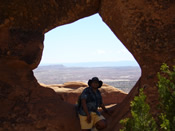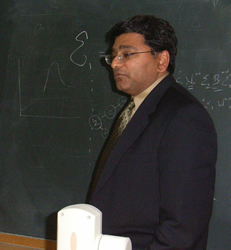Introduction
R. Sekhar Chivukula is a Distinguished Professor of Physics in the UC San Diego Department of Physics. He received his Ph.D. from Harvard University in 1987. Subsequently, he was a postdoctoral fellow and then a faculty member at Boston University. He moved to Michigan State University in 2003 and joined the UC San Diego Physics Department in 2018.
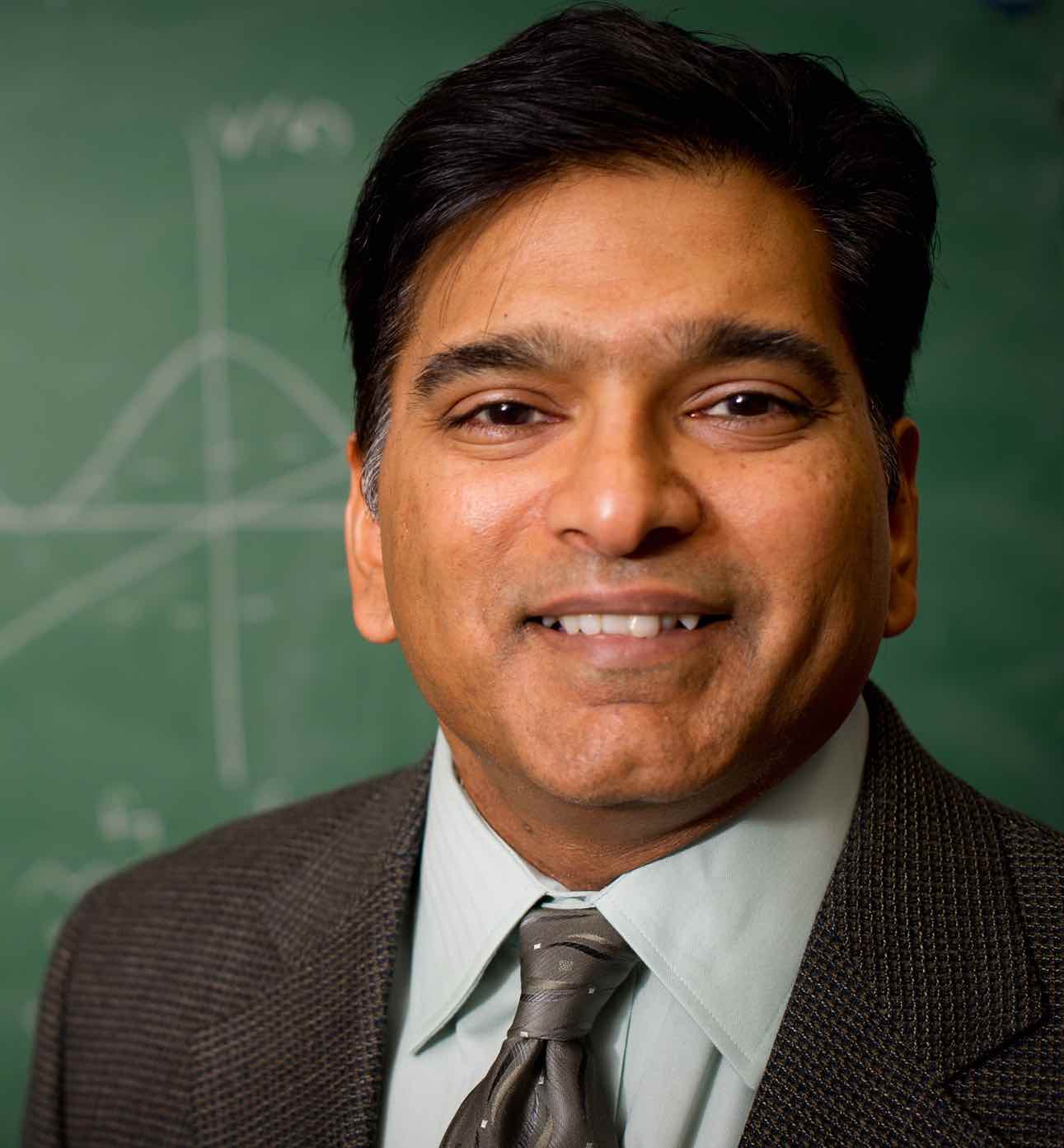
Chivukula's research focuses on the theory of electroweak symmetry breaking and on the phenomenological implications of theories beyond the standard model of particle physics, concentrating especially on physics which can be discovered at the Large Hadron Collider. He teaches at both the graduate and undergraduate level, and he is committed to creating an inclusive environment for all students and to incorporating active learning in all of his classes. Chivukula enjoys making interactive presentations on particle physics and cosmology to the general public and to K-12 students and teachers, as well as working on professional development opportunities for women scientists from the developing world.
Chivukula has served on the Gilman HEPAP (High-Energy Physics Advisory Panel) subpanel, on Department of Energy (DOE) particle physics laboratory review panels of Argonne, Fermilab, and Brookhaven, as a University representative to HEPAP, on the editorial boards of Physical Review Letters and Physical Review D, and serves as a consultant to the Particle Data Group. He was a co-founder of the LHC Theory Initiative, has worked to organize online postdoctoral applications in high-energy theory, and served as Chair of the 2010 Sakurai Prize Committee. He was a recipient of an Alfred P. Sloan Foundation Research Fellowship, a National Science Foundation Presidential Young Investigator Award, a DOE Outstanding Junior Investigator Award, and a is a fellow of the American Physical Society and of the American Association for the Advancement of Science.
At Boston University, Chivukula served as Director of Graduate Studies and Associate Chair for High-Energy Physics in the Department of Physics. At Michigan State University, Chivukula served from 2010-2016 as the Associate Dean for Faculty Development in the MSU College of Natural Science. In that role he organized faculty development programs, oversaw policies for college reappointment, promotion, and tenure, faculty search and mentoring, and implemented college policies for teaching evaluation, faculty annual evaluation and workload, and faculty development. He was a co-founder of the workshop series on Teaching Essentials for MSU Faculty, and of the MSU STEM Educational Alliance. He also served as Project Director for the MSU HHMI STEM education project, LEVERS, and as a Principal Investigator for the Dow STEM Scholars Program.
From 2016-2018 Chivukula served as the Associate Provost for Undergraduate Education and Dean of Undergraduate Studies at Michigan State University. In that role, he was responsible for overseeing University-level undergraduate initiatives that support and enhance the undergraduate experience, providing direction to a number of University-wide programs that serve undergraduate students, and coordinating the development and implementation of academic policies and procedures related to undergraduate education.
At UC San Diego, Chivukula currently serves on the Division of Physical Sciences committee on Equity, Diversity, and Inclusion, and on the Academic Senate Committee on Educational Policy.
Background Information
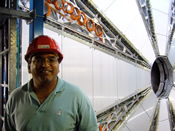
Curriculum Vitae and Publication List in PDF
Selected Awards:
Selected Activities:
Recent
interview on the MSU Diversity and Inclusion website, and
article on MSU WorkLife balance website.
Research
Chivukula is a member of the MSU High Energy Theory Group, and his publications can be found on inSPIRE here or on Google Scholar here.
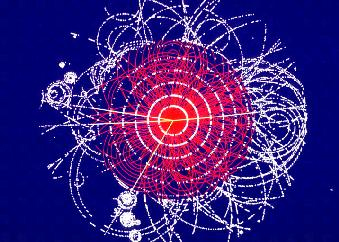
Electroweak Symmetry Breaking:
The modern theory of the fundamental interactions describes electromagnetism (the force responsible for binding electrons to nucleii in atoms) and the weak interactions (the force responsible for radioactive decay of unstable nucleii) through a single unified force - the electroweak force. While these two forces are described symmetrically, they behave quite differently. Electromagnetism is mediated by the photon, a massless particle, and has an infinite range. The weak interaction is mediated by the W and Z particles, which have masses of about 100 times the mass of the proton, and operates only over a very short range. Chivukula studies how the single fundamental electroweak force comes to be manifest in nature in these two very different ways.
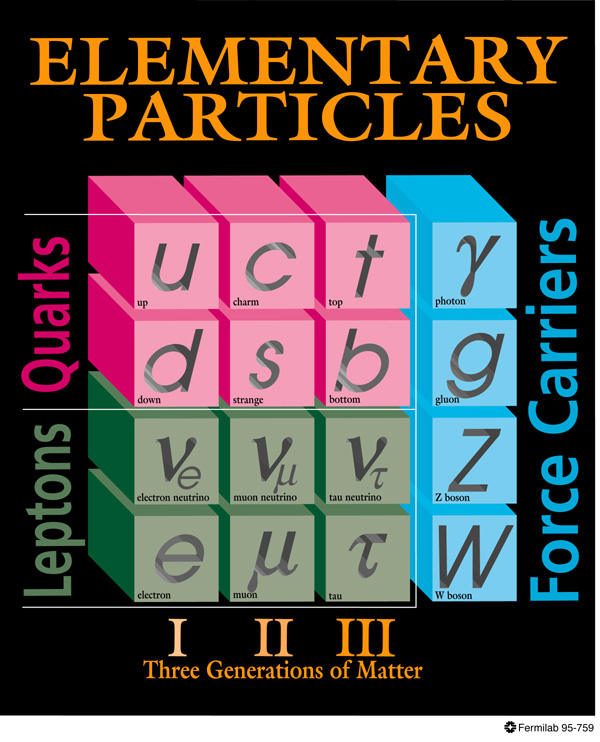
-
Flavor Physics:
The fundamental particles of nature are the quarks (including the up- and down-quarks, the constituents of protons and neutrons) and the leptons (including the electron and its neutral partner, the electron neutrino). Together, the up- and down-quarks and the electron and electron-neutrino comprise the first "generation" of elementary particles. This pattern of two quarks and two leptons is repeated two more times, yielding second and third generations of heavier particles not found inside ordinary atoms. Chivukula studies the origin of the various masses of these elementary particles, and the mixings which allow transitions among them.
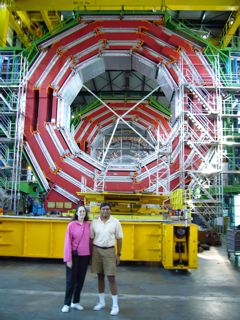
Collider Physics:
High-energy physicists study the fundamental particles and forces of nature by colliding beams of protons or electrons and observing the new forms of matter and energy produced. The Large Hadron Collider (the LHC) at CERN (in Geneva, Switzerland) collides counter-rotating beams of protons, each accelerated to an energy of 7 trilliion electron-volts. Chivukula studies the observable consequences of different theories of electroweak symmetry breaking and flavor physics at current and future colliders, including at the LHC.
Teaching
 Chivukula teaches physics at the graduate and undergraduate level, and incorporates the techniques of active learning in all of his classes. Courses taught at Michigan State University include:
Chivukula teaches physics at the graduate and undergraduate level, and incorporates the techniques of active learning in all of his classes. Courses taught at Michigan State University include:
- LBS/PHY415: Methods of Theoretical Physics (Spring 2005-): Introduction to Mathematical Physics (w/ E. H. Simmons).
- AST 860: Gravitational Astrophysics (Spring 2004): Introduction to General Relativity
- PHY992: Quantum Chromodynamics (Fall 2004): Topics in Nonperturbative Supersymmetry.
- PHY 810: Methods of Theoretical Physics (Fall 2006-8): Graduate core course in mathematical physics.
- PHY854: Quantum Electrodynamics (Spring 2005): Introduction to Quantum Field Theory.
- PHY905: Special Problems in Physics LHC Physics. (Spring 2006): Introduction to Theoretical Collider Physics at the LHC.
- PHY905: Advanced Techniques in Quantum Field Theory. (Spring 2007): Introduction to methods of advanced quantum field theory.
- PHY405: Directed Study. (Fall 2007): Reading Course in String Theory.
Graduate Students:
- Dimitrios Kominis - Boston University Ph.D, 1995
- Vassilios Koulovassilopoulos - Boston University Ph. D, 1995
- Bogdan Dobrescu - Boston University Ph. D, 1998
- Baradhwaj Panayancheri Coleppa - MSU Ph. D, 2009
- Stefano DiChiara - MSU Ph. D, 2009
- Felix Braam - MSU M.S., 2007
- Michael Flossdorf - MSU M.S., 2007
- Arsham Farzinnia - MSU Ph. D student
- Pawin Ittisamai - MSU Ph. D student
Visiting Graduate Students (for up to one year)
- Tomohiro Abe, Masafumi Kurachi, and Shinya Matsuzaki (Nagoya University, Japan)
- Jing Ren (Tsinghua University, China)
MSU Honors College Professorial Assistants
- Garrett Warnell, 2005-06.
- Edita Klymte, 2006-07.
- Tyler Augst, 2007-08.
- Jamie Overbeek, 2008-09.
- Alex Goodin, 2010-11.
- Drew Murray, 2011-12.





 Chivukula teaches physics at the graduate and undergraduate level, and incorporates the techniques of active learning in all of his classes. Courses taught at Michigan State University include:
Chivukula teaches physics at the graduate and undergraduate level, and incorporates the techniques of active learning in all of his classes. Courses taught at Michigan State University include:
